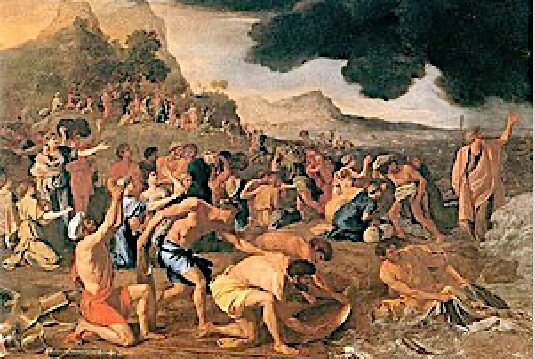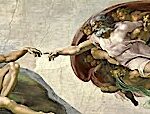Image: The-Crossing-Of-The-Red-Sea by Nicolas Poussin C.1634.
Pope Francis’ General Audience on Migrants, sea and desert
Saint Peter’s Square – Wednesday, 28 August 2024
Catechesis. Sea and desert.
Reflection:
Book of Psalm 107:1-and 107:4-6
O give thanks to the Lord, for he is good; for his steadfast love endures for ever!
4 Some wandered in desert wastes, finding no way to a city to dwell in;
5 hungry and thirsty, their soul fainted within them.
6 Then they cried to the Lord in their trouble, and he delivered them from their distress;
Dear brothers and sisters,
Today, I am postponing the usual catechesis and I would like to pause with you to reflect on the people who – even now – are crossing seas and deserts to reach a land where they can live in peace and safety.
Sea and desert:
These two words recur in many of the testimonies I receive, both from migrants and from those who are committed to helping them.
And when I say “sea”, in the context of migrations, I also mean ocean, lake, river, all those insidious bodies of water that so many brothers and sisters throughout the world are forced to cross to reach their destination.
And “desert” is not only that of sand and dunes, or rocks, but they are also those inaccessible and dangerous territories, such as forests, jungles, steppes where migrants walk alone, left to their own devices.
Migrants, sea and desert.
Today’s migratory routes often involve sea and desert crossings, which for many, too many people – too many! – are deadly.
That is why today I want to reflect on this drama, this pain.
Some of these routes are well known to us because they are often in the limelight; others, the majority, are less known but no less travelled.
I have spoken many times about the Mediterranean, because I am the Bishop of Rome and because it is emblematic. The ‘mare nostrum’ (our sea), a place of communication between peoples and civilizations, has become – the mare nostrum – it has become a graveyard.
And the tragedy is that many of these deaths, the majority of them, could have been prevented.
It must be said clearly: there are those who work systematically and with all means possible to repel migrants – to repel migrants.
And if this is done with awareness and responsibility, it is a grave sin.
Let us not forget what the Bible says: “You shall not wrong a stranger or oppress him” (Ex 22:21).
The orphan, the widow and the stranger are the quintessential poor whom God always defends and asks to be defended.
Unfortunatly some deserts also become cemeteries of migrants.
And even here it is not always a matter of “natural” deaths. No.
Sometimes, they have been brought into the desert and abandoned.
We know the photo of Pato’s wife and daughter, who died of hunger and thirst in the desert.
In the age of satellites and drones, there are migrant men, women and children whom no one is allowed to see: they are hidden.
Only God sees them and hears their cry. And that is a cruelty of our civilization.
In fact, the sea and the desert are also biblical places, of great symbolic value.
They are very important scenes in the story of the Exodus, the great migration of the people led by God through Moses from Egypt to the Promised Land.
These places bear witness to the drama of the people fleeing from oppression and slavery.
They are places of suffering, fear, and despair, but at the same time they are places of passage for liberation – and how many people today cross the seas and the deserts to free themselves.
They are places of passage to redemption, to freedom and to the fulfilment of God’s promises
There is a Psalm that says to the Lord: “your way was through the sea / Your path through the great waters” (77:19).
And another says that He led His people through the wilderness / for His steadfast love endures forever” (136:16).
These words, blessed words, tell us that God himself crosses the sea and the desert to accompany people on their journey to freedom.;
God does not remain aloof, no.
He participates in the drama of the migrants, God is with them, with the migrants,
He suffers with them, with the migrants.
He weeps with them and hopes with them, with the migrants.
It will be good for us today: the Lord is with our migrants in the ‘mare nostrum’,
The Lord is with them, not with those who repel them.
Brothers and sisters, we can all agree on one thing: migrants should not be in these seas and in these deadly deserts. But we will not achieve this result with more restrictive laws, with the militarization of borders, with rejection.
Instead, we will achieve it by expanding safe and legal access routes for migrants, by offering refuge to those fleeing war, violence, persecution and various disasters. w
We will achieve it by promoting in every way a global governance of migration based on justice, fraternity and solidarity.
And by joining forces in the fight against trafficking in human beings, to stop the criminal traffickers who mercilessly exploit the misery of others.
Finally, I would like to acknowledge and praise the commitment of the many Good Samaritans who do their utmost to rescue and save injured and abandoned migrants on the routes of desperate hope, on the five continents.
These courageous men and women are a sign of a humanity that does not allow itself to be contaminated by the pernicious culture of indifference and rejection,
It is our indifference and this attitude of rejection that kills migrants.
And those who cannot be “on the front line” with them – I am thinking of the many good people who are there on the front line, with ‘Mediterranea Saving Humans‘ and so many other associations – are not excluded from this fight for civilization.
We cannot be on the front line but we are not excluded; there are many ways to contribute, first of all through our prayer.
And I ask you: do you pray for migrants, for those who come to our countries to save their lives?
And then they want to send them away…
Dear brothers and sisters, let us unite our hearts and our efforts so that the seas and the deserts are not cemeteries, but spaces where God can open paths to freedom and fraternity. ___________________________________________________
Summary of the Holy Father’s words
Dear Brothers and Sisters:
At this Audience, I invite you to join me in remembering and praying for our brothers and sisters who even today are trying to escape war, violence, persecution and disasters and are settiing out in search of a country where they can live in peace and security.
Many of these migrants, including young children, suffer greatly and die along the way.
Most of these tragedies are preventable
The teaching of Scripture is clear: God especially loves his children who are poor and in need, and we are called to help and defend them.
Instead of more restrictive laws and the militarization of borders, what is needed is an expansion of safe and regular means of access, and a global governance of migration may we based on justice, fraternity and solidarity.
May we not turn a blind eye to these brothers and sisters, may we support those who seek to help them and, above all, may we pray for them.

